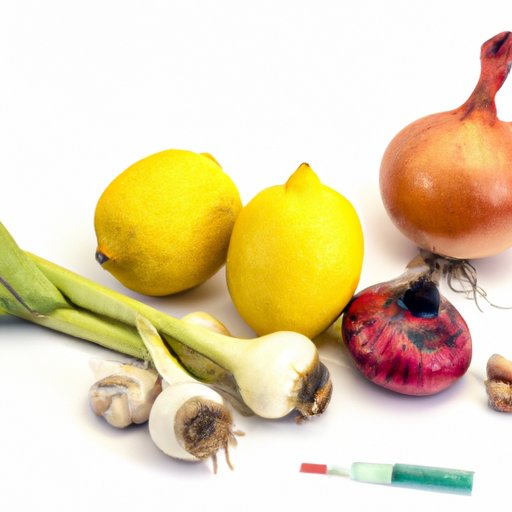I. Introduction
Fever is a natural response of the body to fight off infection, but when it rises to a certain temperature, it can become dangerous. Knowing how to reduce fever is essential for your health and wellbeing. In this article, we will explore natural remedies, medications, foods, and lifestyle changes you can use to bring down fever and strengthen your immune system.
II. Natural Remedies to Reduce Fever
To reduce fever naturally, you need to hydrate your body, cool it down, and boost your immune system. Drinking plenty of fluids, especially water, is crucial to prevent dehydration and help your body flush out toxins. You can also use a cool cloth or compress to lower your body temperature. Other techniques for cooling the body include taking a cool bath or shower, clothing in light, breathable fabrics, and avoiding hot environments.
Elderberry and echinacea are popular natural supplements that have been shown to reduce fever and boost the immune system. However, always consult with your healthcare professional before taking any supplement, especially if you are pregnant, nursing, or taking other medications. If your fever is prolonged or severe, seek medical help immediately.
III. Over-the-Counter Medications for Fever
If natural remedies are not effective in reducing fever, you may need to use over-the-counter medications. The most common medications for fever are acetaminophen (Tylenol), ibuprofen (Advil, Motrin), aspirin, or naproxen (Aleve). These medicines work by lowering the body temperature and reducing inflammation. When taking over-the-counter medications, be sure to read the label carefully, follow the directions, and check with your healthcare provider if you have any concerns.
It is essential to know the correct dosages based on your age and health status. For example, children should not take aspirin due to the risk of Reye’s syndrome. Additionally, some over-the-counter medications can interact with other medicines or conditions, so if you are unsure, it is best to talk to your healthcare professional first.
IV. When to See a Doctor for Fever
It is crucial to pay attention to the symptoms you experience when managing a fever. Common symptoms include headache, muscle aches, chills, sweating, and fatigue. Seek medical attention immediately if your fever persists for more than three days, is above 104°F, or if you experience chest pain, shortness of breath, confusion, or seizures.
Your healthcare provider may recommend tests, such as blood work or imaging, to determine the underlying cause of your fever. Depending on the severity of the fever and its cause, your provider may prescribe antibiotics, antivirals, or other medications to help you recover.
V. Foods and Drinks to Reduce Fever
Your diet plays a significant role in managing your fever. When dealing with a fever, it is essential to eat nutrient-rich foods that are easy to digest. Good options include broths, soups, fruits, vegetables, and lean proteins. Avoid foods that are high in sugar, fat, and processed foods, which can weaken your immune system.
Hydration is also essential when managing a fever. Drinking water, coconut water, and herbal teas can help you stay hydrated and support your immune system. To further boost your immune system, consider incorporating vitamins and minerals, such as vitamin C, vitamin D, and zinc into your diet.
VI. Lifestyle Changes to Reduce Fever
Rest is crucial when managing a fever. Your body needs time to recover, so prioritize sleep and avoid overexertion. Cool, comfortable clothing and a well-ventilated room can help your body temperature stay regulated. Additionally, be aware that stress and overworking can trigger fever, so be mindful of your lifestyle choices.
Adopting healthy lifestyle changes can also help prevent future fever episodes. Simple changes, such as washing your hands frequently, getting vaccinated, eating a nutritious diet, and exercising regularly, can all help boost your immune system and protect against infections.
VII. Conclusion
Fever can be a sign that your body is fighting off infections, but when it persists, it can be dangerous. By implementing natural remedies, medications, foods, and lifestyle changes to reduce fever, you can strengthen your immune system and speed up your recovery. Always remember to seek medical help if your fever is severe and prolonged, and prioritize rest, nutrition, and hydration when managing your fever.
